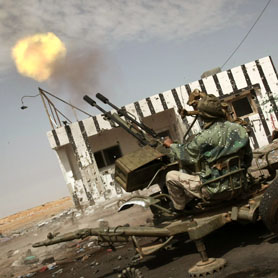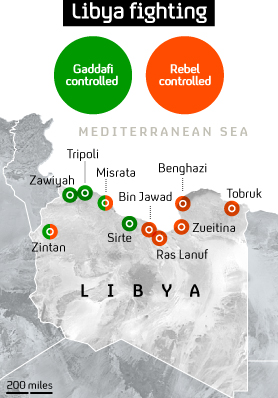Libya: battles for territory intensify
The rebel advance to Libya’s capital, Tripoli, is halted by Gaddafi’s forces – and there’s also heavy fighting in Misrata. International Editor Lindsey Hilsum reports from the frontline in Libya.
Both Gaddafi‘s forces and the opposition are claiming control of Misrata, as US forces attacked three Libyan ships that had been firing on vessels in the port area, destroying one and forcing crews to abandon the others.
Interviewed on Channel 4 News, Libya’s Deputy Foreign Minister Khaled Kaim, said there were still “pockets” of rebels in Misrata, but the situation was “much better than 10 days ago”.
“The people of Misrata came out into the streets yesterday and you will see more people coming to the street – the police force and the internal security force” he said. “This is legitimate government forces. They have to control the situation and calm it down. They will do that.”
Further east the main rebel advance toward the Gaddafi stronghold of Sirte was halted by Government troops. Initially they were pushed back to Nawfaliya and then to Bin Jawad and then further east in Libya.

So far, bombing by allied forces has given rebels the chance to advance forward, re-taking key towns including Ras Lanuf. But on Tuesday they were forced to retreat.
International Editor Lindsey Hilsum said the retreat showed the war was reaching a key moment, as, back in the UK, international powers met to discuss Libya’s future.
“Without coalition airstrikes, the rebels are simply outgunned,” she said.
There are also increasing concerns that the west does not have enough information on the rebels that it is backing against Gaddafi.
Al-Qaeda
NATO’s top operations commander said that intelligence had shown there were “flickers” of al-Qaeda or Hezbollah presence, but there is still no detailed picture of the emerging opposition.
“We are examining very closely the content, composition, the personalities, who are the leaders of these opposition forces,” Admiral James Stavridis told the US Senate.
Read more in the Channel 4 News Special Report on the Arab revolts
While the opposition’s leadership appeared to be “responsible men and women” fighting Gaddafi, Admiral Stavridis said: “We have seen flickers in the intelligence of potential al-Qaeda, Hezbollah, we’ve seen different things.
“But at this point I don’t have detail sufficient to say there is a significant al-Qaeda presence or any other terrorist presence,” he said.
James Blake, intelligence analyst at Janusian, the Risk Advisory Group, told Channel 4 News: “Al-Qaeda type activity among the rebel forces wouldn’t surprise me. There is a strong historical connection between the Libyan Islamic Fighter Group and al-Qaeda, which was most active in the east of the country. A lot of them went over to Iraq. But I am sure there are reanimates active in the country, who are most likely opportunistically taking advantage of the situation.”
Lose-lose
Sir Oliver Miles, Britain’s ambassador to Tripoli in the 1980s, said that in the event that Libya’s opposition rebels overthrow Colonel Muammar Gaddafi, “no one would forget that NATO were responsible, not the rebels.”
He added that if rebels and pro-regime forces enter a prolonged stand-off, the UN resolution will be seen to have failed – so it was a “lose-lose” situation for the western intervention.
The UN Security council voted in favour of resolution 1973, which included the setting up of a no-fly zone over Libya. Predominantly American, British and French planes have executed the resolution, carrying out air strikes.
NATO assumes control of operations on Wednesday, a delay of one day from the original Tuesday hand-over.
Sir Oliver said: “I think that the mandate is pretty close to contradictory as it is, and it will either mean that the UN and NATO have effectively allowed the British, French and Americans to topple a regime, or the rebels lose momentum and lack the ability to strike the decisive blow.”
He added: “If that happens, and it is looking increasingly likely, we will be involved in Libya for a long, long time.”
And amid reports emerging from within Libya that there have been civilian casualties as a result of allied bombing, Mr Miles said he believed the forces had “not gone too far…have not overstepped the UN resolution” because “the numbers of civilians killed by air strikes is probably very small”.
He said: “That’s a tribute to the way the coalition have carried out the air strike…you have to have a sense of proportionality: what is likely to be only a small number of civilian deaths does not mean the resolution is unjustified.”

Libya’s battlelines are currently drawn roughly down the centre of the country, with the rebels more or less in control of much of the east and Gaddafi loyalists controlling the west. It is hard to ascertain which side is in control in Misrata and Zintan, which a being fiercely fought for by both sides, with both claiming to hold the territory.
Rebels repelled
On Tuesday, pro-Gaddafi forces fired heavy weapons at rebels on the road east of the Libyan leader’s home city Sirte overnight, pushing them back towards the town of Bin Jawad.
Rebels had surged from east to west along the coastline, retaking several oil towns after Western air strikes were launched, but what seemed like an unstoppable sweep was curtailed 150km out of Sirte.
Rebels said pro-Gaddafi forces used rockets, rocket propelled grenades and medium-calibre weapons to push back rebels gathered east of Sirte, Gaddafi’s birthplace and a military base.
Misrata, Zintan
A rebel spokesman in east Libya said on Tuesday that 124 civilians had been killed in the past nine days of fighting in the western city of Misrata which has been under attack from Muammar Gaddafi’s forces.
Eight were killed on Monday night, Ahmed Khalifa added.
He said the count was based on numbers obtained from hospitals in the city.
Rebels and forces loyal to Gaddafi both have claimed control over parts of Misrata and fighting appeared to persist in the fiercely contested city, Libya’s third largest.
Khalifa said rebels had destroyed two tanks in the south of Misrata and captured several mercenaries and a Libyan army colonel during fighting, though he did not give precise dates. He also said Gaddafi had sent a busload of people in civilian clothes to the city who opened fire when they got out.